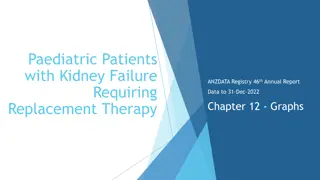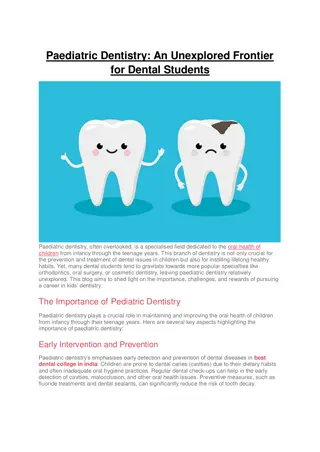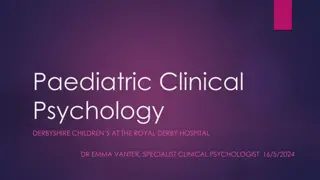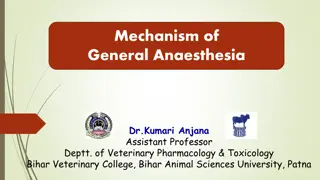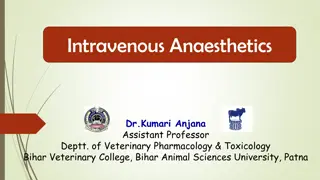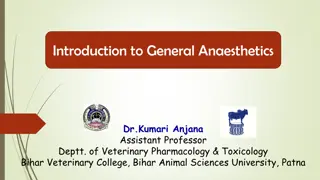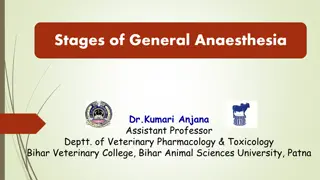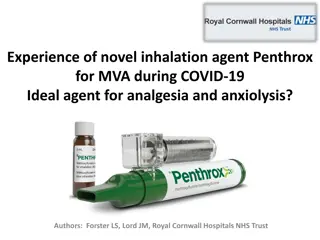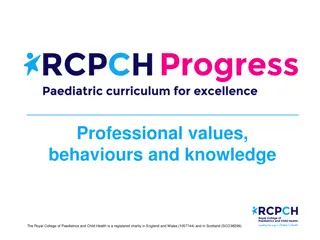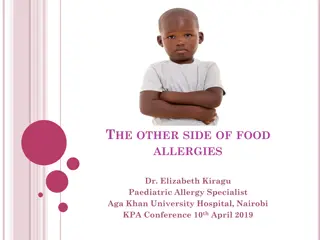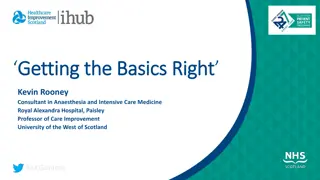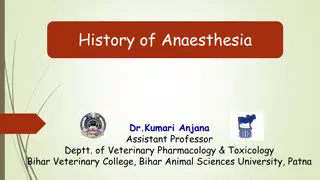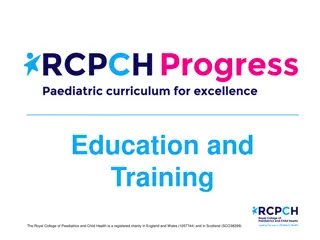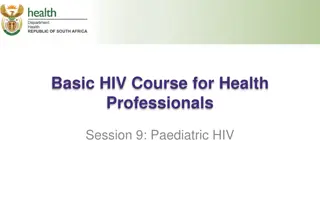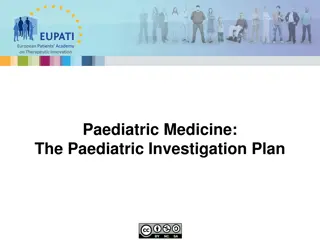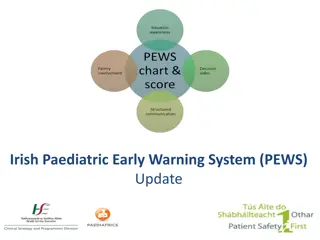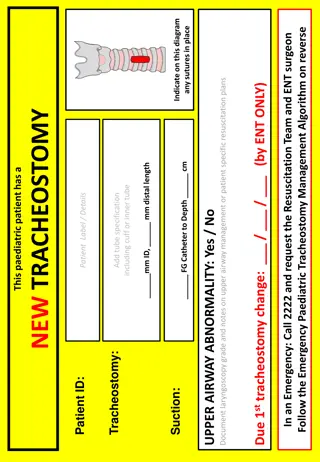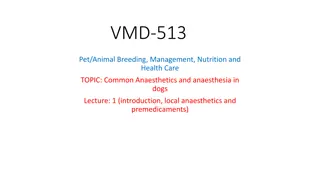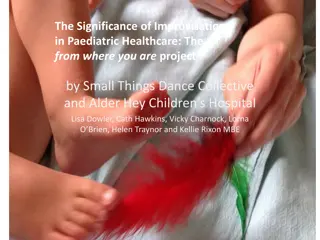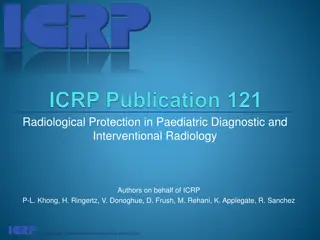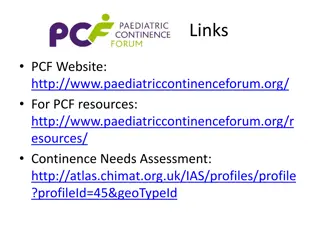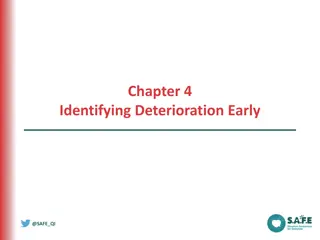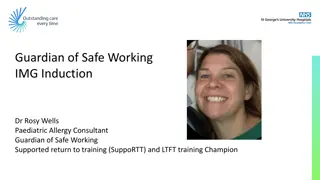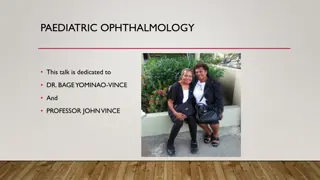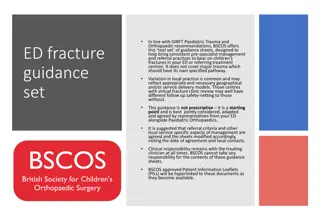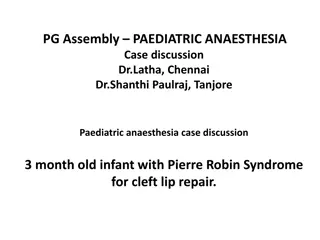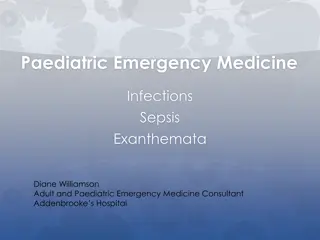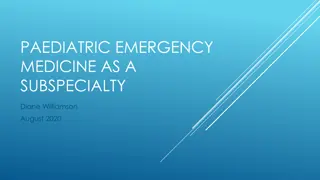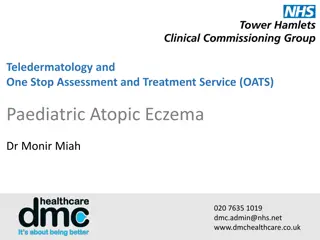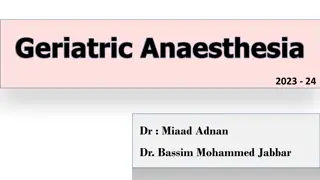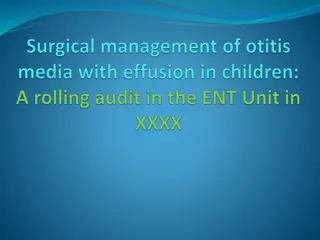Enhancing Pediatric Care with the Irish Paediatric Early Warning System (PEWS)
The Irish Paediatric Early Warning System (PEWS) has been updated to align with National Sepsis Guidance in May 2023. It aims to assist in recognizing and responding to deterioration in pediatric patients, emphasizing the importance of clinical judgment and individualized assessment. PEWS does not r
1 views • 41 slides
Paediatric Patients with Kidney Failure Requiring Replacement Therapy - ANZDATA Registry Insights
Explore the latest data and graphs from the ANZDATA Registry's 46th Annual Report regarding paediatric patients with kidney failure requiring replacement therapy. Discover trends in incidence, prevalence, educational participation, body mass index, hemoglobin levels, use of erythropoietic agents, fe
4 views • 35 slides
Holistic Dental Donvale Sleep Dentistry Melbourne
General anaesthesia can only be carried out in a hospital setting by specialist anaesthetists. Few procedures such as major wisdom teeth surgery or implant surgeries require hospitalisation and treatment by specialist surgeons. We offer referrals and further information if this is the case for you.
4 views • 6 slides
Best TCM Paediatric in Yishun
Looking for the Best TCM Paediatric in Yishun? Then welcome to Le Shan Xing TCM \u4e50\u5584\u884c\u4e2d\u533b\u8bca\u6240. MOH-registered TCM Clinic Le Shan Xing TCM is a forward-thinking homoeopathic clinic dedicated to promoting healthy, alternative practices for managing your pain and discomfort
0 views • 6 slides
Paediatric Dentistry | dental colleges in karnataka RRDCH
Paediatric dentistry, often overlooked, is a specialised field dedicated to the oral health of children from infancy through the teenage years.
1 views • 5 slides
Paediatric Clinical Psychology Services at Royal Derby Hospital
Specialist clinical psychologist, Dr. Emma Vanter, offers paediatric clinical psychology services at the Royal Derby Hospital. The department provides various services including positive behavior support, autism assessment and intervention, youth justice psychology, and more. Referral pathways are e
0 views • 20 slides
Mechanism of General Anaesthesia Theories: Lipid Solubility, Surface Tension, Microcrystal, Protein Binding
Mechanism of general anaesthesia involves theories focusing on the interaction of anaesthetics with cell membrane components like lipids and proteins. The Lipid Solubility theory emphasizes the importance of an anaesthetic's affinity and solubility in nerve cell membranes, while the Surface Tension
1 views • 10 slides
Intravenous Anaesthetics and Barbiturates: Usage, Advantages, and Disadvantages
Intravenous anaesthetics, including barbiturates and non-barbiturates, offer advantages such as easy induction and smooth recovery but come with drawbacks like lack of control over anaesthesia level and contraindications in certain conditions. Barbiturates, derived from melonyl urea, are classified
1 views • 24 slides
Understanding General Anaesthetics in Veterinary Medicine
General anaesthetics induce reversible loss of sensations and unconsciousness, crucial for effective animal surgery. The use of a combination of drugs is essential to achieve safe and rapid effects in balanced general anaesthesia. Large animals present challenges due to their anatomy, making them un
1 views • 12 slides
Understanding the Stages of General Anaesthesia in Veterinary Practice
Explore the four stages of general anaesthesia in animals, from the excitement and analgesia phase to delirium, surgical anaesthesia, and medullary paralysis. Learn about the criteria used to describe depth of anaesthesia and the specific characteristics of each stage. Dive into the complexities of
0 views • 14 slides
Effectiveness of Penthrox for Pain Management in Ambulatory Gynaecology Procedures during COVID-19
Penthrox (methoxyflurane) has shown effectiveness in reducing pain and anxiety in women undergoing abortion procedures under local anaesthesia. This novel inhalation agent offers rapid analgesia and anxiolysis, with lower pain scores and high patient satisfaction reported. The study highlights its p
0 views • 6 slides
Professional Values, Behaviours, and Knowledge in Paediatrics Training
The Royal College of Paediatrics and Child Health outlines the essential professional values, behaviours, and knowledge required for paediatric trainees. This includes maintaining confidentiality, understanding legislation related to safeguarding, and demonstrating ethical conduct across different h
0 views • 14 slides
Understanding and Managing Food Allergies: Insights from Dr. Elizabeth Kiragu's Presentation
Dr. Elizabeth Kiragu, a Paediatric Allergy Specialist, shared valuable insights on the challenges and strategies in dealing with food allergies at the KPA Conference in April 2019. The presentation highlighted the importance of allergen avoidance, risk assessment, education for caregivers, and regul
0 views • 21 slides
Enhancing Patient Care in Anaesthesia and Intensive Care Medicine
Kevin Rooney, a Consultant in Anaesthesia and Intensive Care Medicine, shares insights on improving patient outcomes at the Royal Alexandra Hospital. Topics covered include identifying deteriorating patients, conflicts of interest, and the importance of comprehensive care improvement strategies. The
0 views • 34 slides
Evolution of Anaesthesia: From Ancient Methods to Modern Techniques
Anaesthesia has come a long way from ancient methods like cold concussion and hypnosis to modern techniques using nitrous oxide, ether, and chloroform. The discovery and evolution of anaesthesia through key milestones like the introduction of nitrous oxide, ether anaesthesia demonstration, and chlor
0 views • 12 slides
Paediatric Training and Education Overview
The Royal College of Paediatrics and Child Health provides structured training and education for healthcare professionals in paediatric settings. The curriculum covers key capabilities at different levels, emphasizing teaching, supervision, assessment, and mentorship. The program focuses on creating
0 views • 22 slides
Paediatric HIV Testing and Treatment Guidelines
Understanding the importance of early diagnosis in HIV-infected infants and children is crucial for timely intervention and improved health outcomes. This session covers testing algorithms, initiation of antiretroviral therapy, viral load monitoring, and legal issues related to HIV testing in childr
2 views • 31 slides
European Patients Academy on Therapeutic Innovation: Paediatric Investigation Plan (PIP)
The Paediatric Investigation Plan (PIP) is essential in ensuring the quality, safety, and efficacy of medicine development for children. It involves meticulous planning to ethically and scientifically gather necessary data for a medicine's use in children. The PIP covers various aspects, such as the
0 views • 18 slides
Irish Paediatric Early Warning System (PEWS) Update and Implementation Overview
Explore the latest updates on the Irish Paediatric Early Warning System (PEWS) including learning outcomes, aims, observation charts, key points, escalation guide, and response pathways. Understand the importance of clinical judgment, individualized assessment, and standardized communication for rec
0 views • 15 slides
Emergency Paediatric Tracheostomy Management Algorithm
Emergency Paediatric Tracheostomy Management Algorithm provides a structured approach for managing pediatric patients requiring tracheostomy in emergency situations. The algorithm outlines steps for assessing airway patency, performing suction, and changing the tracheostomy tube if necessary. It emp
0 views • 4 slides
Common Anaesthetics and Anaesthesia in Dogs Overview
This content covers the general considerations, definitions, phases, and types of anaesthesia used in dogs. It discusses the importance of selecting appropriate drugs and techniques based on the patient's species, breed, age, health status, and procedure requirements. Key topics include local anaest
0 views • 22 slides
Improvisation in Paediatric Healthcare: Small Things Dance Collective at Alder Hey Children's Hospital
Explore the significance of improvisation in paediatric healthcare through the innovative arts for health program at Alder Hey Children's Hospital. Small Things Dance Collective, in partnership with the hospital, uses improvisation and contact improvisation to engage patients in various art forms, o
0 views • 44 slides
Paediatric cardiac surgery in India - GoMedii
Paediatric cardiac surgery in India involves specialized medical procedures to treat congenital and acquired heart conditions in children. Renowned for its advanced healthcare infrastructure, India offers state-of-the-art facilities and experienced s
0 views • 8 slides
Challenges and Trends in Managing Disordered Eating Presentations in Acute Hospitals During Covid-19
A greater burden of unmet mental health needs has emerged during lockdowns, with a notable increase in disordered eating cases since 2021. There has been a rise in presentations to acute hospitals, revealing gaps in services and posing challenges to joint working. The trend in paediatric admissions
0 views • 13 slides
Understanding the Importance of a Healthy Diet for Children by Collette Green, Specialist Paediatric Dietitian
A healthy diet is essential for children to meet their nutritional needs and support growth and development. Collette Green, a Specialist Paediatric Dietitian at ESNEFT, highlights the crucial elements of a child's diet, including energy, protein, vitamins, minerals, and fiber. The article covers he
0 views • 19 slides
Radiological Protection in Paediatric Diagnostic and Interventional Radiology
Radiological protection in paediatric diagnostic and interventional radiology is crucial due to the higher risk per unit of radiation dose for infants and children compared to adults. The justification for using radiological examinations should prioritize patient benefits, with emphasis on optimizat
0 views • 36 slides
Paediatric Continence Forum: Improving Children's Continence Care
Explore the initiatives of the Paediatric Continence Forum (PCF) aimed at enhancing continence care for children and young people. Learn about PCF's resources, origins, membership, lobbying methods, vision for excellence in care, and key publications including NICE-accredited guides. Join the moveme
0 views • 20 slides
Recognizing Deterioration Early in Paediatric Patients
Improving outcomes for paediatric patients hinges on promptly identifying and responding to signs of deterioration. This chapter delves into the importance of early detection, focusing on Paediatric Early Warning Scores and Systems (PEWS). It emphasizes the need for standardized approaches and touch
0 views • 11 slides
Guardian of Safe Working at St. George's University Hospitals
Dr. Rosy Wells, a Paediatric Allergy Consultant, serves as the Guardian of Safe Working at St. George's University Hospitals. She supports the return to training (SuppoRTT) and LTFT training. Exception reporting is highlighted as a crucial system to address safety concerns and ensure junior doctors'
0 views • 7 slides
Insights into Paediatric Ophthalmology: Common Conditions and Trachoma Treatment Strategies
Explore the world of paediatric ophthalmology through a detailed discussion on common eye conditions needing co-management, such as congenital anomalies and retinopathy, as well as the debilitating effects of trachoma caused by Chlamydia infection. Trachoma can lead to blindness if left untreated, e
2 views • 27 slides
Paediatric Fracture Management Guidelines and BOAST Recommendations
This guidance provides tools and sheets for consistent pre-specialist management and referral practices for children's fractures in the Emergency Department (ED) or referring treatment centers. It covers principles for assessing mechanisms, imaging, classification, and definitive management of fract
0 views • 24 slides
Paediatric Anaesthesia Case Discussion: Challenges of Anaesthetizing an Infant with Pierre Robin Syndrome
Pierre Robin Syndrome (PRS) presents challenges in paediatric anaesthesia, especially in infants undergoing procedures like cleft lip repair. PRS is characterized by micrognathia, glossoptosis, and respiratory distress. Other syndromes associated with cleft lip include Treacher Collins syndrome, Gol
0 views • 56 slides
Paediatric Emergency Medicine Overview: Infections, Sepsis, Exanthemata, and Warning Signs
Paediatric emergency medicine involves assessing and managing various conditions in children, such as infections, sepsis, and exanthemata. This overview covers the evaluation of febrile children, warning signs indicating potential serious illness, and the importance of thorough examination and asses
0 views • 48 slides
Paediatric Emergency Medicine Subspecialty Training Overview
Paediatric Emergency Medicine (PEM) is a specialized field within Emergency Medicine offering two routes to subspecialty training, with competencies organized into domains and a competency-based assessment approach. Trainees undergo a one-year PEM training program with rotations in a Paediatric Emer
0 views • 11 slides
Comprehensive Guide to Managing Paediatric Atopic Eczema in Primary Care
In this guide, you will find key facts about paediatric eczema, tips for treatment in primary care, and advice on managing atopic eczema in the community. From using topical steroids effectively to recommending proper skincare routines and avoiding irritants, this resource covers essential informati
0 views • 15 slides
Geriatric Anaesthesia: A Guide to Perioperative Care for Elderly Patients
The field of geriatric anaesthesia addresses the unique challenges faced by elderly patients undergoing surgery, including higher perioperative complication rates due to reduced functional reserve and co-morbidities. This guide emphasizes the importance of careful preoperative assessment, meticulous
0 views • 25 slides
Evaluation of Adherence to National Guidelines in Paediatric Patients for Surgical Management of OME
Retrospective review of clinical notes revealed that paediatric patients with OME and recurrent AOM generally met the criteria for surgery as per national guidelines (CG60). Compliance with guidelines was satisfactory, with approximately 81% adherence observed among clinicians. Cases of non-adherenc
0 views • 9 slides

